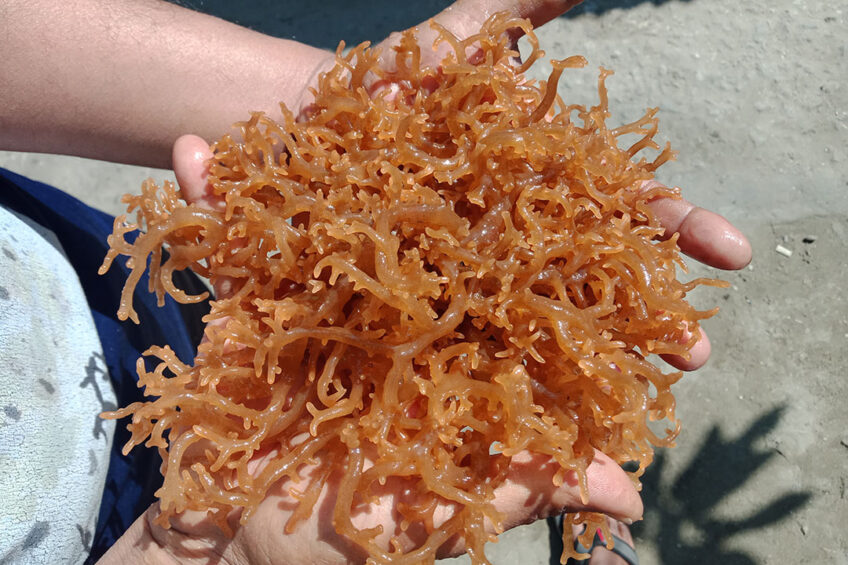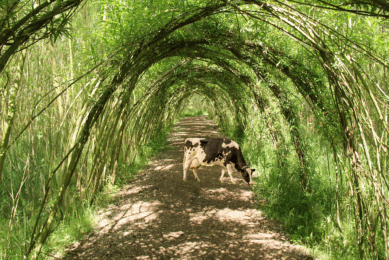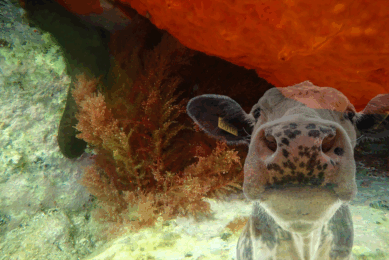Benefits of tropical red seaweed by-products in crossbred calves

The by-products of tropical red seaweed improve the health and growth performance of crossbred calves, a new study reveals.
The consideration for this extremely low-cost and relatively easy-to-cultivate animal feed source is continually developing, and its utilisation is diversifying into various animal species. There have been many studies on including seaweeds in the diets of pigs, cows, sheep, and poultry. One such study showed that seaweed supplementation enhances nutrient digestibility, milk yield and elements, feed conversion, rumen fermentation activity, and blood serum proteins when fed to lactating Friesian cows.
However, data on tropical seaweed as a feed supplement are comparatively few and are mostly on in vitro fermentation and anti-methanogenic activity. Thus, insufficient research has been done on the supplementation of 3 abundantly available tropical red seaweeds (Kappaphycus alvarezii, Gracilaria salicornia and Eucheuma spinosum), especially on the performance and health benefits of calves.
The study
Researchers of the current study assessed the comparative effects of supplementation of these tropical red seaweeds on growth performance, nutrient intake, haemato-biochemical parameters, antioxidant status, and immunological and endocrine variables of growing cross-bred calves. A total of 24 growing crossbred calves were used in this study with the 3 tropical red seaweed species K. alvarezii, G. salicornia and E. spinosum. Each seaweed by-product was mixed thoroughly at a 2.5% inclusion level in a concentrate mixture to form the 3 treatment groups fed for 180 days. In the fourth group (control), calves were fed a standard diet without seaweed.
Growth performance
Throughout the 6-month study period, the initial body weight, final body weight, and average daily gain were found to be similar among the groups. However, the seaweed by-products showed numerically higher weight gain compared to the control group; improvement in weight gain were 3.3%, 5%, and 2.8% for the K. alvarezii, G. salicornia, and E. spinosum seaweed by-products, respectively. A similar trend was observed for the feed conversion rate, with improvements being 4.4% for the K. alvarezii group, 5.1% for the G. Salicornia group, and 1.9% for the E. spinosum group.
From the results, it was revealed that the intake of nutrients between treatment groups did not change concerning the inclusion of red seaweed by-products. It was determined that the inclusion of seaweed by-products of up to 2.5% of concentrate mixture does not influence the palatability of the diet, resulting in similar dry matter intake values between the groups. Likewise, the cell wall constituents were not influenced by seaweed inclusion, and the total digestible nutrient values in the different groups were similar.
Conversely, in a previous study, researchers showed higher dry matter intake when brown seaweed meal was added to the diet of steers on a low-quality hay-based diet. “Generally, the data on the use of seaweed in ruminant trials have produced inconsistent results, and this could be attributed to the variations in the seaweed genera, species – red algae, green algae, and brown algae – and discrepancies in the techniques used for harvesting and processing algae including collection, cleaning, and drying, or the proportions used,” researchers said.
In the present research, it was also evident that the inclusion of seaweed by-products has no impact on the digestibility of dry matter, organic matter, crude protein, ether extract, neutral detergent fibre, and acid detergent fibre. The nutrient digestibility remained similar between the different groups. Focusing on protein digestion, the researchers stated: “One of the concerns about feeding seaweed is the presence of phlorotannins, which bind proteins and reduce proteolysis, potentially reducing the degradability of nitrogen in the rumen.”
Serum parameters
The study shows that including red seaweed by-product-based formulations at 2.5% in the concentrate mixture had no adverse effect on the serum biochemical profile of growing crossbred calves. The serum haematological analysis showed no significant influence on white blood cells, red blood cells, and haemoglobin.
According to the researchers, since the current study did not show significant changes among controls and calves offered seaweed by-products, it can be concluded that the seaweeds had no negative effects on erythropoiesis, and, thus, maintained the health of calves. Similarly, the serum concentration of glucose, total protein, albumin, globulin, creatinine, total cholesterol, total triglyceride urea, aspartate aminotransferase, alanine aminotransferase, and alkaline phosphate was similar between the different treatment groups. Despite seaweed being a rich source of iodine, serum concentrations of thyroid hormones were also not influenced by seaweed supplementation.
Higher cortisol levels observed in animal trials are often attributed to metabolic stress, among other factors; in the current serum, concentrations of cortisol were similar between the seaweed groups and the control group.
Antioxidant status and immune response
In the study, researchers found higher activities of the antioxidant enzymes superoxide dismutase (SOD), catalase (CAT) and glutathione peroxidase (GHS-Px) in the seaweed groups compared to the control group as markers of antioxidant status (Table 1). Serum immunoglobulin G level in the seaweed-added groups was significantly higher than in the control group. In addition, a time effect was detected with the advancement of the calves’ age. The increased immune response was connected to a combination of bioactive compounds in seaweeds. Besides other bioactive compounds found in seaweed, both K. alvarezii and G. salicornia are rich sources of vitamin C, carotenoids, and vitamin E, positively affecting the immune system.
Conclusion
The researchers concluded that dietary supplementation with tropical red seaweed by-products at 2.5% in the concentrate mixture improves the health of crossbred calves as observed with improvements in immune response and antioxidant status, without any alteration in hormonal profile, serum metabolites, liver enzymes, endocrine variables, and growth performance.
Based on the original article by P. Anderson, R. Malik, L. Ojha, B. Adjei‑Mensah, and H. B. Naliyapara. 2023. Investigations on modulating effect of 3 tropical red seaweed by-products on growth performance, immune response, antioxidant status and endocrine variables in crossbred calves. Journal of Applied Phycology, Vol 35:445–457.











